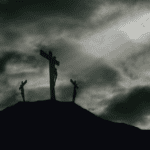Part of the series “My Year In…”
I frequently borrow library books that I don’t read. Perhaps I like the title and the idea of their contents more than the reality. Among the books I do end up reading, they tend to fall into four categories: books for research or work; books I could not resist; books for sleep; and books that are all of the above.
Books for Research or Work
1. Things Hidden Since the Creation of the World (René Girard)
I don’t quite remember how I discovered Girard, the French writer who began as a literature lecturer in America and went on to become an influential anthropologist and philosopher. This book fits very firmly in the “philosophy nerd” category, but his theory of mimetic desire revolutionised my understanding of human nature. Girard believes that being made in God’s image doesn’t just mean we have dignity and value, but that we tend to copy or mimic others. We were created to imitate Christ, but when our parents or friends provide models we also imitate them. I’ve read parts of his other books, but this one was my favourite. It helped me understand not only our dignity as humans but also our tendency to evil behaviour through copying what we see around us.
2. Truth be Told (Lionel Windsor)
My review of this book earlier this year acknowledged I don’t read many “Christian” books and usually turn to podcasts or articles to grow spiritually and theologically. Windsor’s Truth Be Told is a notable exception, tackling how we should think about truth and misinformation amidst the left and right cultural wars. On social media and in public discourse, there are often statements like “I did my own research” that show mistrust with mainstream sources of information. On the other side, some say “do your own research” thinking truth is cut and dried and easy to find. Windsor reminds us that there is ambiguity and confusion in politics, science, research, and media, but that God’s truth is absolute and undeniable. His systematic and heartfelt treatment of truth in the Bible is reassuring and hopeful for Christians seeking certainty.
3. But the Girl (Jessica Zhan Mei Yu)
I read this novel because a colleague was planning to speak to the Melbourne-based author for their podcast. I was struck by Yu’s ability to raise issues of race, the migrant lived experience, coming of age as a young woman, and chronic pain. The novel references The Bell Jar while also making subtle allusions to faith in God, likely stemming from the author’s own Christian faith.
Books I Could Not Resist
4. Yellowface (Rebecca F. Kuang)
Kuang’s first contemporary novel came after her success writing historical fantasy. Yellowface explores the issue of cultural appropriation with a darkly funny and deeply unlikable (but also strangely likable) protagonist. It’s a brilliant parody of the cycles of celebrity and cancellation amidst shifting waves of popular ideology. Helpfully it doesn’t demonise or idealise either side of the story. It’s also very, very funny.
5. Tell Me Everything (Elisabeth Strout)
Some rare novels give me a sense that God is working in me despite not being written by a Christian or for Christians. Tell Me Everything spoke gently to my spirit for my sanctification and healing as I read about Strout’s beloved characters. Strout writes about happiness, disappointment, families, illness, and change in ways that make life feel somehow more precious. Even the dark stories let in the light and left me renewed. Tell Me Everything is Strout’s latest release and prompted me to re-read every other book she has written.
6. The Great Divorce (C. S. Lewis)
The Great Divorce came into my life when I was processing whether or not to become a Christian in 1999. It was summer and I was sick in bed with a fever. I had borrowed it from a church where I had attended an evangelistic talk and met Christians who took me through the book of Romans. In the novel’s foreword, Lewis makes the case for there being one way to God. The Holy Spirit worked through its persuasive tenderness on my mind and heart. When I woke up, I wanted to be a Christian with all my heart and sought out a Christian friend to pray for me and tell me what to do next.
I recently re-read this book on a plane and, 25 years later, was again struck by its comfort and challenge. I then read it aloud to my teenage daughter. The Great Divorce is a book about the gulf between heaven and hell, sin and sanctification, and the mercy of God that we cannot fully comprehend but must try.
Books for Sleep
People have sometimes asked me how I fit in so much reading and I usually answer, “Because I can’t sleep otherwise”. A book for sleep needs to have the kind of prose that transitions you from a world of tasks and responsibilities and towards the dream world. Some books are so good they take me months to read because one line or one paragraph is enough to make me take off my glasses, close the book and turn off the lamp.
7. Diary of a Void (Emi Yagi)
I read this novel slowly. I could have devoured it, but Diary of a Void was so effective as a sleep aid that I made it last. Emi Yagi’s novel challenges the subtle sexism of Japanese work culture through her protagonist. Ms Shibata, unmarried, childless and one of the few females in her department, finds herself regularly singled out to serve coffee, distribute snacks and tidy up after meetings—despite it not being part of her job description. One day, repulsed by the cigarette butts and dirty coffee cups in the meeting room she is summoned to attend, Shibata tells her line manager that she is pregnant and too nauseous to clean up. Her task is reassigned to a young male colleague who promptly spills it on an important guest. Likely because he has never served coffee in his life. She’s not pregnant, of course. Or is she? Yagi’s novel pinpoints the unpaid labour that women do in workplaces with wry, subtle humour and artful and delicate prose.
You can read my further reflection on Diary of A Void here.















